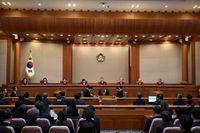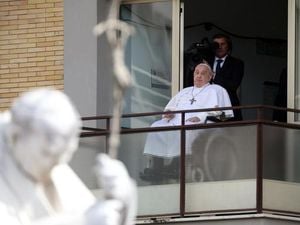On April 4, 2025, the Constitutional Court of South Korea delivered a historic ruling, officially impeaching President Yoon Seok-yeol, making him the second president in the nation’s history to be removed from office through an impeachment trial. This decision came after a unanimous vote by all eight justices of the court at 11:22 AM, immediately stripping Yoon of his presidential duties.
The ruling followed a tumultuous period marked by Yoon's controversial declaration of a state of emergency on December 3, 2024, which had sparked widespread criticism and allegations of overreach. The court’s chief justice, Moon Hyung-bae, announced the verdict, stating, "We impeach President Yoon Seok-yeol, the respondent," emphasizing the gravity of the situation.
Yoon's impeachment was rooted in five key allegations put forth by the National Assembly. These included violating constitutional and legal requirements by declaring the emergency, issuing unconstitutional directives, and using military and police forces to disrupt the normal functioning of the National Assembly. Additionally, he faced accusations of attempting to unlawfully seize control of the Central Election Management Committee and directing the surveillance of prominent political figures.
In its ruling, the Constitutional Court found that all arguments presented by Yoon’s defense were unconvincing. The justices concluded that the emergency declaration was not justified, highlighting that it failed to meet both substantive and procedural requirements as mandated by law. The court emphasized that the declaration was not a legitimate response to political crises but rather an abuse of power that threatened the democratic fabric of the nation.
"The emergency powers were invoked in a manner that shocked the populace and caused chaos across various sectors including society, economy, and politics," the court stated. This ruling not only marked a significant moment in South Korea’s political landscape but also underscored the judiciary's role in upholding constitutional integrity.
Furthermore, the court pointed out that Yoon's actions constituted a severe betrayal of the public trust. As president, he was expected to unify the nation and protect its constitutional order. Instead, he undermined the authority of constitutional institutions and violated the basic rights of citizens by mobilizing military forces against them.
The court's decision to impeach Yoon was framed as a necessary step to safeguard the constitutional order. Chief Justice Moon remarked, "The negative impact of the respondent's legal violations on the constitutional order is significant, and the benefits of constitutional protection gained from this impeachment outweigh the national losses incurred by removing a sitting president." This statement reflects the court's commitment to maintaining democratic principles even in the face of political turmoil.
Yoon's impeachment represents a pivotal moment in South Korean politics, particularly given the country’s history of political upheaval. He is now the fourth president to face impeachment, following in the footsteps of former presidents Park Geun-hye and Roh Moo-hyun, who also faced similar fates due to political scandals and controversies.
As the news of Yoon's impeachment spread, reactions poured in from various sectors of society. Supporters of the ruling viewed it as a necessary action to restore democratic norms and accountability, while critics of the court's decision raised concerns about the implications for executive power and governance in South Korea.
The ruling has ignited discussions about the future of South Korea's political landscape. Observers note that the impeachment could lead to a significant shift in the political dynamics as the country prepares for the next presidential elections. With Yoon's presidency now officially over, speculation arises regarding who will succeed him and how the political parties will maneuver in the wake of this unprecedented event.
As South Korea moves forward, the implications of this impeachment will likely resonate throughout its political framework, raising questions about the balance of power, the role of the judiciary, and the expectations of elected officials. The Constitutional Court's decisive action serves as a reminder of the importance of accountability in governance and the ongoing struggle for democratic integrity in the nation.
In summary, President Yoon Seok-yeol's impeachment marks a significant turning point in South Korean history, reflecting both the challenges and responsibilities of leadership in a democratic society. The ruling reinforces the principle that no one is above the law and that the protection of constitutional rights remains paramount in the face of political crises.
![[속보] 윤석열 대통령 탄핵 인용...대통령직 '파면'](https://thumbor.evrimagaci.org/Qo45jubbBQ7LHRxOVmTw6HR0mKk=/200x0/tpg%2Fsources%2F09b13c8d-89de-4b3b-99fc-cd793762f6fa.jpeg)

![[속보] 헌재, 윤석열 탄핵 '인용'](https://thumbor.evrimagaci.org/d4IuX1tlToCglQcaHS_-TP0NNhU=/200x0/tpg%2Fsources%2F8cefb38a-02c1-4ed6-acf2-88f05e39f597.jpeg)
![[속보]헌재, 尹탄핵 인용…대통령 파면 헌정 두번째](https://thumbor.evrimagaci.org/sft_r9XxbzPHarlgqV8VAKAGb5g=/200x0/tpg%2Fsources%2Fc35da9f7-3e08-4db4-b895-97017a81047e.jpeg)




